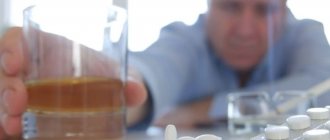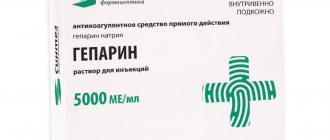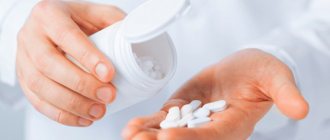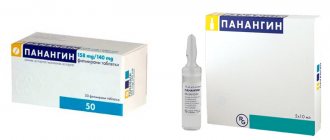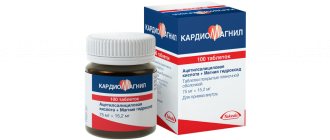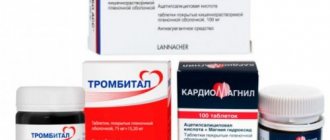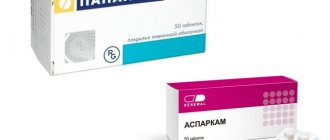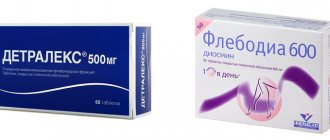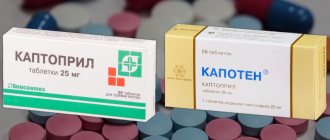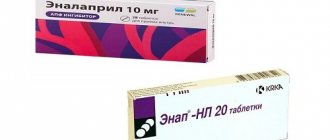Aspirin is a popular drug in the category of non-steroidal anti-inflammatory drugs. It is also used for the prevention of diseases of the cardiovascular system. There is one persistent myth that aspirin thins the blood and is indicated for the prevention of cardiovascular diseases. However, this is not entirely true. Aspirin affects blood clotting and, as a result, the process of thrombus formation. But the thickness of the blood is affected by the amount of hemoglobin and red blood cells. The lower their value, the more liquid the blood in the body.
In this article we will consider in detail the drug aspirin cardio. How does it differ from the usual simple aspirin, what effect does it have on the body and cardiac activity in particular.
Medicine aspirin cardio
In addition to the fact that the drug belongs to the category of NSAIDs and has an antipyretic effect and analgesic effect, aspirin cardio is used in the primary prevention of diseases of the cardiovascular system and in the secondary prevention of myocardial infarction. Reduces the risk of developing the disease with unstable angina. The drug is prescribed for cardiovascular pathologies due to its antithrombotic effect.
The main difference between the drug and regular aspirin is that aspirin cardio is coated with a special enteric coating. Due to this, it is used for long courses in cardiology. This coating allows the active substance to be released in the intestines, thereby minimizing one of the main side effects of aspirin - damage to the gastric mucosa.
Composition of the drug
The active ingredient of the drug is acetylsalicylic acid.
Excipients include corn starch and cellulose powder.
The enteric coating contains polysorbate, sodium lauryl sulfate, talc and other compounds.
Thus, when prescribing the drug, individual intolerance to the components of the composition should be taken into account.
Release form and dosage
The drug aspirin cardio is available only in the form of enteric-coated tablets in dosages of 100 mg and 300 mg.
The number of tablets in a package can be: 20 pcs., 28 pcs., 56 pcs.
conclusions
The use of Aspirin Cardio as a preventive and therapeutic agent has certain limitations. Considering the risk of bleeding and disruption of the hemostasis system, the drug should be taken only as prescribed by a doctor - a cardiologist or therapist. Antiplatelet therapy is indicated for patients with cardiovascular and cerebral diseases and a high risk of thrombosis. To prevent the development of adverse reactions or progression of the underlying pathology, before taking acetylsalicylic acid, you should read the instructions and consult with your doctor.
Indications for aspirin cardio
- Primary prevention of acute myocardial infarction, taking into account aggravating risks - hypertension, diabetes mellitus, obesity, smoking.
- Prevention after a heart attack.
- Stable and unstable angina (including suspicion of acute myocardial infarction).
- Prevention of stroke (including in patients with transient cerebrovascular accident).
- Prevention of cerebrovascular accidents.
- Prevention of thromboembolism after operations on blood vessels and arteries (bypass surgery, endarterectomy, angioplasty and stenting).
- Prevention of deep vein thrombosis and thromboembolism of the pulmonary artery and its branches (including long-term immobilization as a result of extensive surgery).
Methods of application
The method of administration and dosage regimen of the drug depend on its release form and other factors. The optimal dosage regimen is determined by a specialist based on specific indications. It is advisable to take aspirin cardio tablets orally before meals with plenty of liquid, preferably at the same time, once a day.
The duration of therapy is determined by the doctor. The usually recommended dose is 100 mg 1 time per day, but the approach to the dosage regimen is individual. Depending on the indications, it may increase to 300 mg/day.
Primary prevention of acute myocardial infarction in the presence of risk factors: 100 mg/day or 300 mg every other day.
- The recommended dosage for the prevention of recurrent infarction is 100-300 mg/day.
- For unstable angina, as well as the onset of myocardial infarction, the initial dose is 100-300 mg. In this case, the first tablet is chewed to speed up absorption. The drug should be taken as soon as possible at the slightest suspicion of danger. For a month after the attack, a maintenance dose of 200-300 mg/day is recommended. Further, all treatment recommendations are prescribed by a specialist based on the patient’s vital signs.
- Prevention of stroke and cerebrovascular accident: 100-300 mg/day.
- Prevention of thromboembolism after vascular surgery: 100-300 mg/day.
- Prevention of deep vein thrombosis and pulmonary embolism: 100-200 mg/day or 300 mg every other day.
The compliance of the dosage form of a particular drug with the indications for use and dosage regimen should be strictly observed.
Comparison of the effectiveness of Aspirin Cardia and Cardiomagnyl
Aspirin Cardia is more effective than Cardiomagnyl - this means that the ability of the drug substance to provide the maximum possible effect is different.
For example, if the therapeutic effect of Aspirin Cardia is more pronounced, then with Cardiomagnyl it is impossible to achieve this effect even in large doses.
Also, the speed of therapy is an indicator of the speed of therapeutic action; Aspirin Cardia and Cardiomagnyl are also different, as is bioavailability - the amount of a drug substance reaching the site of its action in the body. The higher the bioavailability, the less it will be lost during absorption and use by the body.
Contraindications
Express contraindications include:
- allergy to the active substance and components of the drug,
- Gastrointestinal diseases, including erosions, ulcers in the acute stage,
- diseases of the bronchopulmonary system
- hemorrhagic diathesis,
- pregnancy and lactation (the 1st and 3rd trimesters are considered especially dangerous)
- aortic aneurysm
- renal or liver failure
- and children under 15 years of age.
Comparison of side effects of Aspirin Cardia and Cardiomagnyl
Side effects or adverse events are any adverse medical event that occurs in a subject after administration of a drug.
Aspirin Cardia has almost the same adverse events as Cardiomagnyl. They both have few side effects. This implies that the frequency of their occurrence is low, that is, the indicator of how many cases of an undesirable effect of treatment are possible and registered is low. The undesirable effect on the body, the strength of influence and the toxic effect of Aspirin Cardia are similar to Cardiomagnyl: how quickly the body recovers after taking it and whether it recovers at all.
Special Recommendations
Aspirin cardio and chronic diseases
Particular caution should be exercised when taking aspirin for persons suffering from diseases of the respiratory system. The fact is that taking aspirin causes a narrowing of the bronchi, which can cause so-called aspirin asthma, or provoke asthma, which is in remission.
Aspirin cardio and childhood
When taken in its pure form in children, due to their young age, the concentration of glucose in the plasma can sharply decrease, in parallel with this, the level of ketone bodies in the blood increases, plasma acidification occurs, and fatty acids accumulate in the liver. These metabolic disturbances lead to swelling of tissues and organs.
Children become more than just lethargic. Aggravating symptoms such as cramps, diarrhea, rapid breathing and palpitations may occur. Up to loss of consciousness and severe muscle hypotension. Such conditions in children can be life-threatening, so the drug is contraindicated for them.
Aspirin cardio and alcohol
The combined use of alcohol and aspirin is not recommended. Alcohol and alcohol-containing products are known for their vasodilating properties. But in combination with aspirin, the effect can be most unexpected. The risks of bleeding increase, including in diseases of the gastrointestinal tract, exacerbation of liver diseases or the occurrence of any acute symptoms associated with this organ.
Aspirin cardio and pregnancy
The active substance freely and easily penetrates the placental barrier, which can lead to negative consequences for the fetus.
When used in the first trimester, it leads to the development of a “cleft palate” (cleft palate); in the third trimester, it causes inhibition of labor, premature closure of the ductus arteriosus in the fetus, disruption of the functioning of the pulmonary vessels and hypertension in the pulmonary circulation.
Acetylsalicylic acid is also excreted in breast milk, which increases the risk of bleeding in the baby due to impaired platelet function. Therefore, the advisability of using the drug during pregnancy and lactation should be justified by the specialist making the decision on the prescription.
Comparison of the safety of Aspirin Cardia and Cardiomagnyl
The safety of a drug includes many factors.
At the same time, it is higher for Cardiomagnyl than for Aspirin Cardia. It is important where the drug is metabolized: drugs are excreted from the body either unchanged or in the form of products of their biochemical transformations. Metabolism occurs spontaneously, but most often involves major organs such as the liver, kidneys, lungs, skin, brain and others. When assessing the metabolism of Cardiomagnyl, as well as of Aspirin Cardia, we look at which organ is the metabolizing organ and how critical the effect on it is.
The risk-benefit ratio is when the prescription of a drug is undesirable, but justified under certain conditions and circumstances, with the obligatory observance of caution in use. At the same time, Cardiomagnyl has fewer risks when used than Aspirin Cardia.
Also, when calculating safety, it is taken into account whether only allergic reactions occur or possible dysfunction of the main organs. In other matters, as well as the reversibility of the consequences of using Cardiomagnyl and Aspirin Cardia.
Rules for taking the drug
Advertising:
Aspirin Cardio can be prescribed in different dosages, depending on the disease and condition of the patient. There are instructions on when and how often to take the medicine - in the morning on an empty stomach or in the evening after meals, once or several times a day.
Compliance with the dosage regimen is required not only to avoid the manifestation of side symptoms, but also for greater effectiveness of the drug.
The standard instructions are as follows:
- It is necessary to take aspirin during or after meals;
- take the medicine with plenty of water;
- strictly follow the indicated dosage.
Usually the average dosage is prescribed - from 100 mg to 300 per day. It depends on the severity of the disease, the intensity of prevention and the weight of the patient. The frequency of administration can be regular - every day, or every other day. The drug is prescribed in a course for long-term use.
Main component
The main active ingredient of the product is acetylsalicylic acid.
.
Its mechanism is based on the ability to act on platelets. Blood cells do not stick together and, as a result, do not form blood clots. This property led to the use of the drug in the treatment of:
- varicose veins;
- stroke;
- heart attack.
The effect is created by inhibiting the synthesis of a special substance thromboxane A2
in platelets, “responsible” for the formation of clots. In its absence, gradual thinning of the blood and resorption of blood clots occurs. In large doses, acetylsalicylic acid can reduce body temperature and eliminate pain.
Many people, when treating at home, replace aspirin with vitamin C to lower the temperature: this is a mistake, since the substances are not analogues.
The remaining components of the medicine are auxiliary. These include cellulose and corn starch. The enteric coating of the tablet contains polysorbate, sodium sulfate, talc and other components.
Dexpanthenol ointment is a popular remedy against burns. But the scope of application of the ointment is much more diverse, there are many indications. Description and composition of Dexpanthenol ointment Dexpanthenol (ointment) is a drug with a regenerating effect, which is prescribed for external use. Read more in the article: “What is dexpanthenol ointment used for?”
Note
It is necessary to take into account the characteristics of the patient’s health status when prescribing the drug. Taking aspirin can aggravate the symptoms of a number of diseases or become a threatening factor in their development.
Advertising:
For this reason, the doctor always tries to find out the full picture of the patient’s condition, being interested in diseases that are not related to the main issue of treatment.
Situations in which caution is required when taking aspirin:
| Related factors | Side effects of aspirin |
| Gout | Increased uric acid and exacerbation of the disease. |
| Arterial hypertension | If the form is uncontrolled, there is a possible risk of hemorrhagic stroke. |
| Upcoming surgery | It is necessary to discontinue the drug several days in advance, as the risk of severe bleeding increases. |
It is worth remembering that when taking medications with a similar effect - thrombolytics, anticoagulants - aspirin is taken only as directed. Abuse of such drugs leads to blood clotting disorders, which threatens health and life even with mild bleeding.
